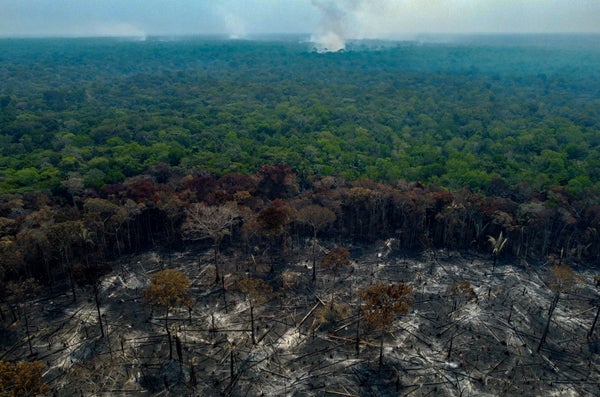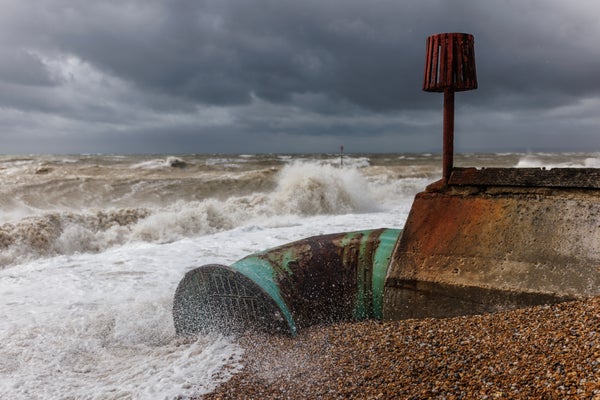Welcome to The Independent's weekly round-up on the climate crisis, and the solutions to tackle it. Thanks for reading - LB | |
|
Bonnie Baxter reads an obituary to Great Salt Lake, standing on the parched lakebed, to raise awareness of its plight. The lake hit a historic low in November 2022 (Courtesy of Bonnie Baxter/Salt Lake Tribune) |
|
|
Some things are so precious, so essential for the common good, that they cannot be bought or sold. They fall, instead, to the public trust, a common law doctrine dating to the Roman Empire.
Great Salt Lake is one. The world's eighth largest saline lake is the cornerstone of Utah's outdoorsy lifestyle, supports 7,700 jobs and creates $1bn in annual economic output. Millions of migratory birds flock to its shores, earning it the reputation of "America's Serengeti".
And, it is dying.
The lake hit a historic low in November 2022. Despite a subsequent record snowfall that winter, its footprint remains one-third what it was a few decades ago. That's 11ft lower than when the lake was first measured in the mid-1800s. Without dramatic intervention, the lake will disappear in five years, according to research from Brigham Young University last year.
The threats to Great Salt Lake are colliding on two fronts. More water is being diverted upstream for booming development, which has made Utah the fastest-growing US state, particularly in the Salt Lake City area. Meanwhile, long foretold consequences of climate change are bedding in, drying up rivers and streams, and worsening an already two-decade long megadrought in the southwest.
The climate crisis is just one of the hot-button issues on US voters' minds ahead of the 2024 presidential election in November. People are concerned about how to cope with immediate impacts - from the rise in extreme weather events, for example - but also how climate change will unfold over the longterm.
Over the coming year, The Independent will talk to people across the US about the issues which matter to them where they live as part of our new series, Global Warning. As always, we'd love to hear your thoughts and suggestions on what we cover, and where we should be looking.
For our first piece, I spoke to Dr Bonnie Baxter, a biology professor at Westminster University in Salt Lake City.
Dr Baxter isn't a climate scientist by trade. Instead, her work focuses on "really tiny things", the microbial communities, which form the base of Great Salt Lake's entire ecosystem. "I think about the life that lives in extreme environments and what kind of secrets can it teach us about surviving environmental damage," she told The Independent.
Dr Baxter has witnessed the lake's disappearance up-close. She arrived in Utah in the late Nineties, drawn west from her native North Carolina by a love of camping and hiking, and to work at the small, private liberal arts college.
Despite the lake's unique characteristics it had been long overlooked for research. This meant ripe opportunities for Baxter's undergraduates, away from areas typically crowded by post-grads and PhDs. "[My students] present at international meetings because it's a system that's so understudied that everything we do is novel," she said.
That work also turned Baxter into Great Salt Lake's go-to person. "I had to suddenly become an expert on a lake system, which was not my background. I fell into that relationship with the lake lovingly, but a little from the side," she said. "When I talked to people about the lake, they would say it's a stinky place, or tell me a negative story. I was having all of these amazing scientific and personal experiences, and I thought, this lake just needs attention."
She founded Great Salt Lake Institute in 2008 to expand scientific research and raise awareness about an ecosystem heading for collapse. The latter has involved some unusual tactics for a scientist, including in 2019, when she and a colleague, Jaimi Butler, wrote the lake's obituary.
"We took the perspective of a person in the future writing an obituary for a woman, what she had contributed to society, and what we missed about her," she said.
In a video, Baxter stands on the parched lakebed, wearing a black dress. "Great Salt Lake experienced her final glimmering sunset today, succumbing to a long struggle with chronic diversions, exacerbated by climate change," she says. "She supported Utah's economy for many years, but we did not adequately fund her healthcare in time. Had we done so, we may not be mourning her death today."
She closes: "In lieu of flowers, conserve water and call your legislators to advocate for smart water laws. In keeping with her salty personality, she requested that her admirers play the song "Another One Bites The Dust at her memorial."
Baxter said the performance left her emotional. "I think that's when I started to understand that Great Salt Lake, and these other saline lakes in the world, are canaries in the coal mine," she said.
"They are so dependent on water inflow and when that changes, from either diversions or climate change, we're going to see them shrink before we see changes in other systems.
"That's when I started thinking of myself as studying climate change, because that was never my intent. But when this happens to a system that you know and love, you have to start trying to clamor about that."
Read the full feature here
More climate news this week from The Independent:
Japan's cherry blossoms have bloomed early, causing alarm
Canada has early start to wildfire season as 'zombie' blazes smoulder underground
Can mapping 'sky rivers' anticipate extreme flooding?
Only 1 hour of extreme heat exposure can increase risk of stroke, scientists discover
|
|
|
As an Indian and an entrepreneur, I'm extremely proud of seeing this getting built up. I think building energy infrastructure is the greatest nation-building thing we can do. |
|
|
Life in the climate crisis |
|
|
Try 6 months of Independent Premium for just £6 |
Enjoy unlimited Premium news analysis, advert-free reading, a digital newspaper every morning, and more |
|
|
|
|
|
| Join the conversation or follow us |
| |
Download the free Independent app |
|
|
Please do not reply directly to this email You are currently registered to receive The Independent's climate newsletter. To unsubscribe from The Independent's climate newsletter, or to manage your email preferences please click here. This e-mail was sent by Independent Digital News and Media Ltd, 14-18 Finsbury Square, London EC2A 1AH. Registered in England and Wales with company number 07320345
Read our privacy notice and cookie policy
|
|
|
|














No comments:
Post a Comment
Keep a civil tongue.